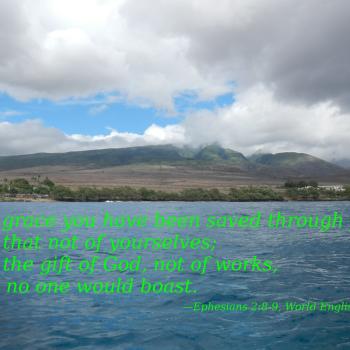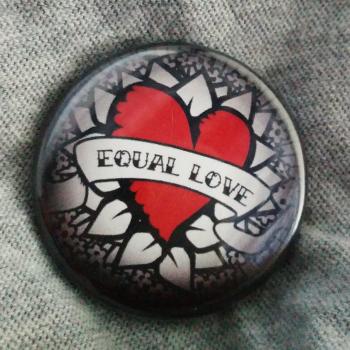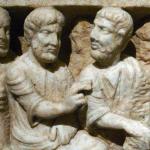
Christianity is meant to be the religion of love, a religion whose adherents follow the way set by Christ in his ministry, a way which includes helping those in need. Paul, therefore, tells us that those who are “strong” are to take care of the “weak,” instead of merely focusing on their own wants and desires at the expense of others:
We who are strong ought to bear with the failings of the weak, and not to please ourselves; let each of us please his neighbor for his good, to edify him. For Christ did not please himself; but, as it is written, “The reproaches of those who reproached thee fell on me.” (Rom. 15:1-3 RSV).
There are those who are physically strong or weak, such as those who are in good or ill health, so that those who have good health should look after those who do not. There are those who can be said to be “economically strong,” that is, those who are wealthy, and those who are “economically weak,” that is, those who are impoverished, and in this context, those who have money should use it for the sake of the common good. There are also social strengths and weaknesses: society gives privilege to some, and those who have such privilege should use it to help those who are not so privileged, indeed, to do what they can to reform society so that those who suffer as a result of social biases find their suffering eliminated as they are welcomed as an equal member of society. This is why Christians should be at the forefront in the work for social justice.
But, there is also those who are “spiritually strong” and “weak.” That is, those who are spiritually strong have attained some level of holiness, or had some sort of spiritual experiences which have enlightened them, while those who are weak, either find themselves far from holy, or not having many, if any, spiritual experiences. Those who have experiences with God, such as mystics, should not selfishly get so caught up in attaining those experiences time and time again at the expense of those who do not have any, such as was suggested by quietism; rather, they should use what they have experienced to help others either learn what they have learned, or better yet, to find a way to have spiritual experiences of their own. Those who are spiritually weak, such as those dominated by some sort of sinful habit, should not be abused by those who are spiritually strong. This is why no one should go out of their way to judge or condemn those who are “sinners,” for those who do that are not using their own spiritual strength to help those in need, but are undermining them, leading them to the edge of despair. For, we must remember, in relation to God, we are all spiritually weak, and whatever we have is as a result of God and God’s grace; what would we be like if God treated us as we treated others?
We must, therefore, be hospitable and welcoming, for, by doing so, we follow Christ, who has welcomed us in our weaknesses: “Welcome one another, therefore, as Christ has welcomed you, for the glory of God” (Rom. 15:7 RSV). Indeed, throughout the Gospels. Jesus used his strength to help the poor and needy, while he admonished the rich and powerful who hurt them. Similarly, he forgave those sinners who came to him seeking his love and grace, while he warned those who were so-self-assured in their righteousness and social worth that they were not all they thought they were.
Jesus turned everything upside-down and inside out, which is why he often repudiated those who thought they were favored by God because of their material or spiritual gifts, even as he healed those who were in need, those who were often deemed worthless by society. Because he could do so, he was quick to heal those who came seeking his help:
And as Jesus passed on from there, two blind men followed him, crying aloud, “Have mercy on us, Son of David.” When he entered the house, the blind men came to him; and Jesus said to them, “Do you believe that I am able to do this?” They said to him, “Yes, Lord.” Then he touched their eyes, saying, “According to your faith be it done to you.” And their eyes were opened. And Jesus sternly charged them, “See that no one knows it.” But they went away and spread his fame through all that district. (Matt. 9:27-31 RSV).
When Jesus healed people, not only did he take care of their physical maladies, he offered them the grace they needed for spiritual healing. Those who came to him with faith and love accepted the love he offered them and so they found themselves transformed in body and soul. He didn’t treat anyone who honestly sought his aid with contempt. Rather, he gave them his love, even if society did not. We should do likewise. We should help those who are in need, those who are weak in some way we are strong, especially if their status in society, or even in the church, has had them suffer all kinds of abuse. We should not turn a blind eye to their maladies. If the problem is social, we should change society, that is, work to change things so that social injustice is no longer acceptable. If they need physical healing, we should make sure they get what is available, working, likewise, to overturn the burdens put in their way from receiving what is otherwise available to others (as, for example, happens to those who are poor or social outcasts).Christians must, as Paul said, bear not only with the weak, but their failings, which is why we should never use such failings, such as sin, as an excuse to justify ignoring those in extreme need. For, if we do that, then, we, who are also weak, risk creating the conditions by which we will lose out what God has offered us, for we will be turning to way of love to unlove, and with such unlove, turn ourselves way from God because God is love.
Stay in touch! Like A Little Bit of Nothing on Facebook.
If you liked what you read, please consider sharing it with your friends and family!
N.B.: While I read comments to moderate them, I rarely respond to them. If I don’t respond to your comment directly, don’t assume I am unthankful for it. I appreciate it. But I want readers to feel free to ask questions, and hopefully, dialogue with each other. I have shared what I wanted to say, though some responses will get a brief reply by me, or, if I find it interesting and something I can engage fully, as the foundation for another post. I have had many posts inspired or improved upon thanks to my readers.

















